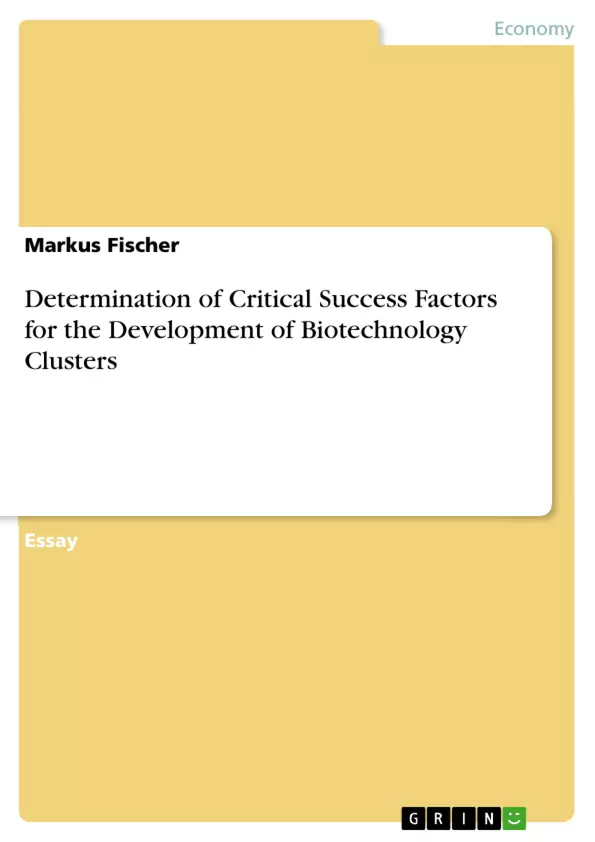In this paper I am going to discuss factors that initiate and drive the clustering of biotechnology companies. In a first step I will address the question of defining a cluster as such. I then turn to a discussion of believed beneficial outcomes by referring to the works of Porter who claims that among others clusters attract the formation of new businesses and also result in growth of the respective cluster . In the light of ten case studies I will then assess the relevance and impact of critical factors on the creation and development of biotechnology clusters. The findings of the case studies suggest relevant key factors and prerequisites for biotechnological clusters to emerge and to develop. Special emphasis will be placed on the question whether or not the beneficial outcomes of clustering as described by Porter can be confirmed by the case studies and the implications that follow as far as the beneficial outcomes are not being confirmed. The paper will conclude with a theoretical framework that is aimed at capturing the virtuous cycle of biotechnology clusters
Inhaltsverzeichnis (Table of Contents)
- Introduction
- Porter's Position
- Strength of the Local Scientific Base
- Research conducted by large established companies
- Research that is conducted by universities
- Public R&D investments
- Quality of research and critical mass of research
- Reputational effects
- Industry-University Relations and Cooperations
- Access to Market Capital
- Protection of Intellectual Property Rights
- Labour Market Pooling
- The Virtuous Cycle of Biotechnology Clusters
- Conclusion
Zielsetzung und Themenschwerpunkte (Objectives and Key Themes)
This paper examines the factors that initiate and drive the clustering of biotechnology companies. The main objective is to evaluate the relevance and impact of critical factors on the creation and development of biotechnology clusters, using ten case studies. The paper aims to analyze whether the anticipated positive outcomes of clusters, as suggested by Porter, can be confirmed by the case studies.
- The importance of clusters for competitive success and new business formation
- The critical success factors for the development of biotechnology clusters
- The role of scientific research and university-industry collaborations
- The impact of access to market capital and intellectual property protection
- The virtuous cycle of biotechnology clusters
Zusammenfassung der Kapitel (Chapter Summaries)
The introduction defines the concept of a cluster and introduces Porter's position on the benefits of clusters. It then sets out the scope of the paper and the key factors that will be examined.
Porter's position highlights the importance of clusters for economic competitiveness and the formation of new businesses. The chapter also raises questions about the definition of clusters and the critical mass required for their formation.
The chapter on the strength of the local scientific base explores the role of university research, public R&D investments, and the quality of research in fostering the development of biotechnology clusters. Case studies from the UK, Germany, and Italy are used to illustrate these points.
The chapter on Industry-University Relations and Cooperations examines the importance of strong relationships between universities and businesses in driving innovation and cluster development. The chapter discusses how these collaborations can provide access to knowledge, talent, and resources.
The chapter on Access to Market Capital explores the importance of financial resources for the growth of biotechnology clusters. The chapter discusses different sources of capital, including venture capital, angel investors, and government grants.
The chapter on Protection of Intellectual Property Rights discusses the importance of protecting intellectual property rights for the success of biotechnology companies and clusters. The chapter explores different mechanisms for protecting intellectual property, such as patents, trademarks, and trade secrets.
The chapter on Labour Market Pooling examines the importance of a skilled and specialized workforce for the development of biotechnology clusters. The chapter discusses how clusters can attract and retain talent through education and training programs, as well as attractive employment opportunities.
The chapter on The Virtuous Cycle of Biotechnology Clusters presents a theoretical framework that captures the interconnected relationships between different factors that contribute to the development of biotechnology clusters.
Schlüsselwörter (Keywords)
Biotechnology clusters, critical success factors, industry-university relations, scientific research, market capital, intellectual property rights, labour market pooling, Porter's theory of clusters, virtuous cycle.
Frequently Asked Questions
What is a biotechnology cluster?
A biotechnology cluster is a geographic concentration of interconnected biotech companies, universities, and specialized suppliers that foster innovation and growth.
What are the critical success factors for biotech clusters?
Key factors include a strong local scientific base, university-industry collaborations, access to market capital, and protection of intellectual property rights.
What is Porter's theory on clusters?
Michael Porter claims that clusters attract new businesses, increase productivity, and drive the direction and pace of innovation.
Why is "labour market pooling" important for biotech?
A specialized workforce allows companies to find skilled talent easily, while workers benefit from diverse employment opportunities within the same region.
What is the "virtuous cycle" of biotechnology clusters?
It is a self-reinforcing process where initial success attracts more capital, talent, and research, leading to further growth and innovation.
- Citar trabajo
- Markus Fischer (Autor), 2006, Determination of Critical Success Factors for the Development of Biotechnology Clusters, Múnich, GRIN Verlag, https://www.grin.com/document/59640



